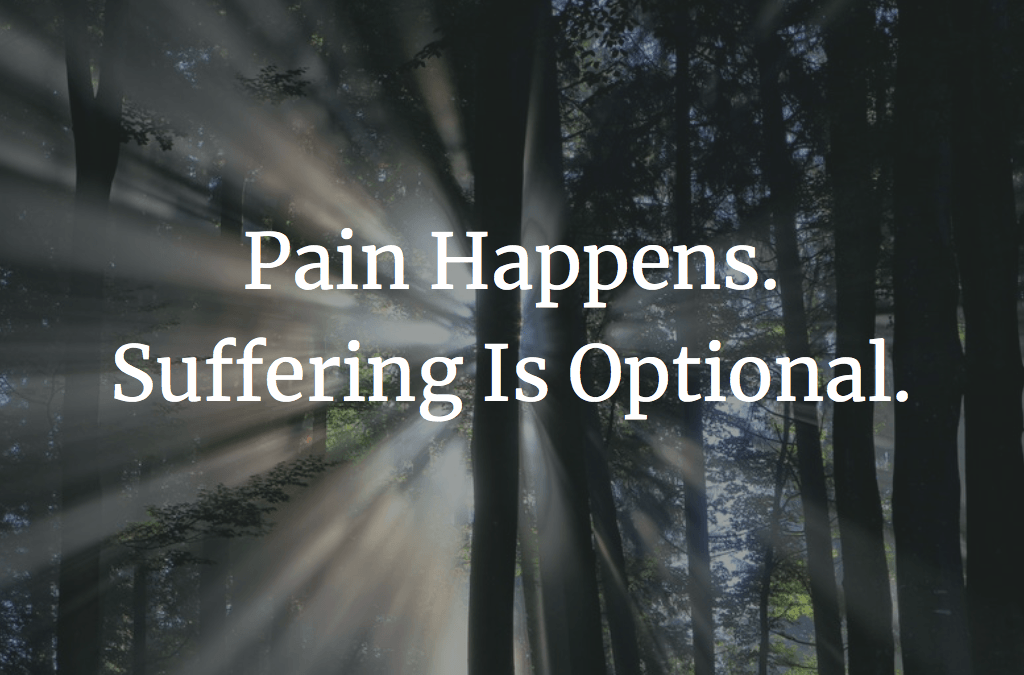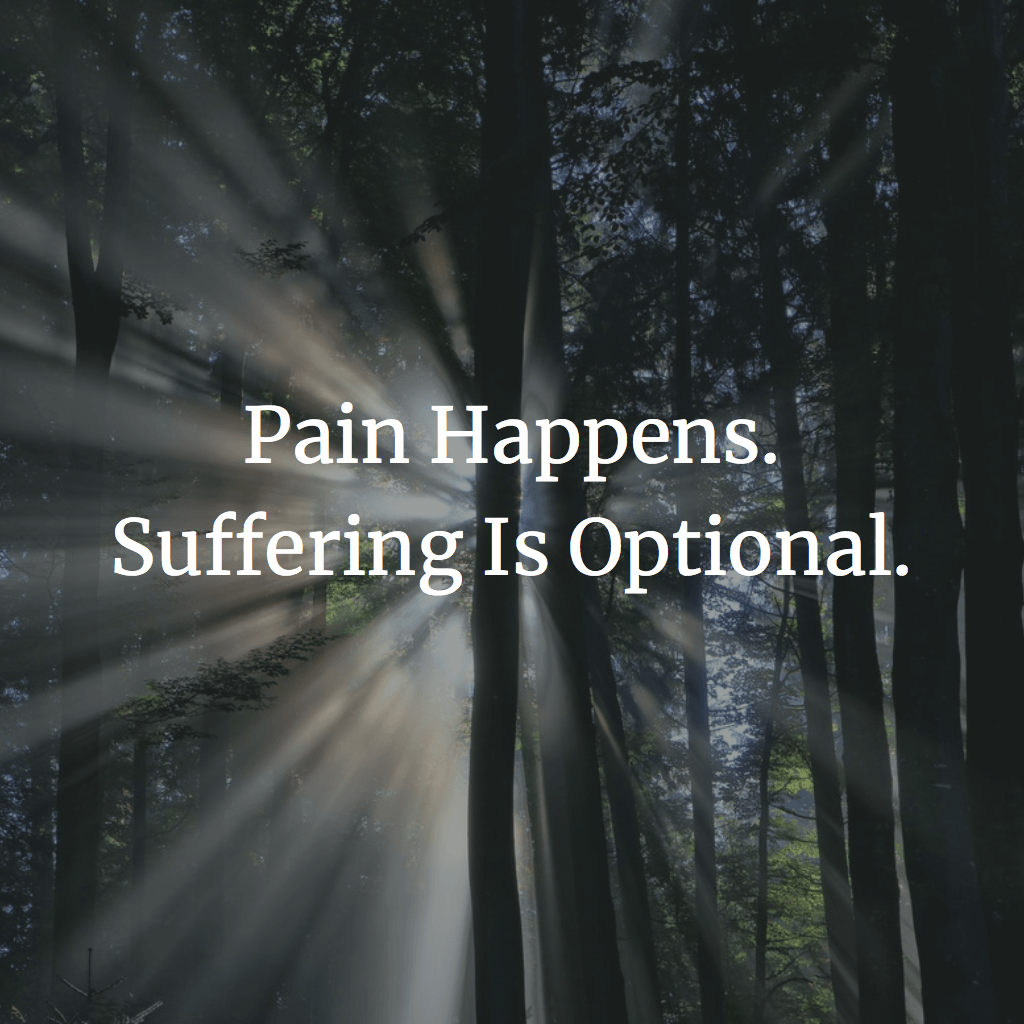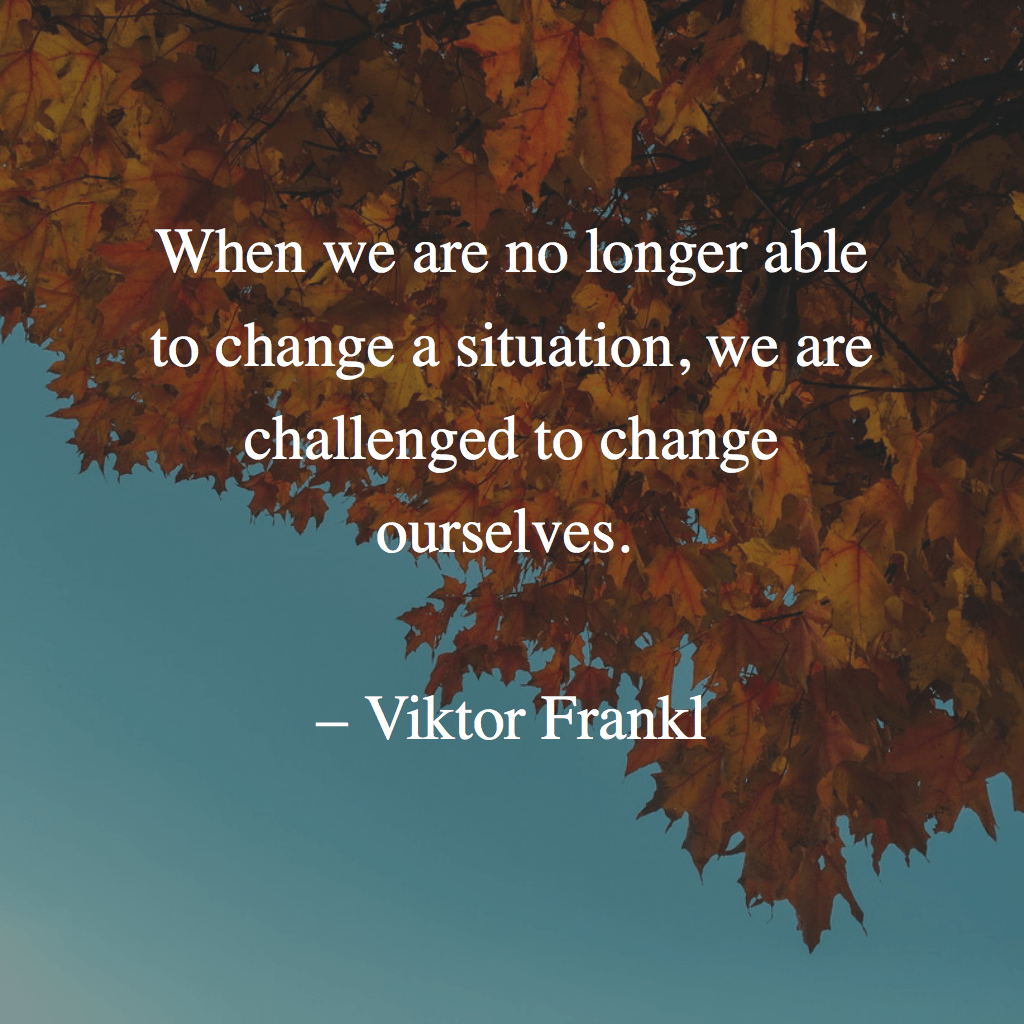Pain Happens. Suffering is Optional.
Frankl and Hudson Give Us Insights On How To Deal
“Pain is a part of life, but suffering is optional.”
–Ancient Buddhist Proverb
Not a single one of us humans will ever escape the ebbs and flows of life. Yes, pain happens, but the suffering can be optional. What does that mean? Let’s start with a couple powerful examples of people who experienced profound pain in their lives.
Many of us have heard about Viktor Frankl, the author of Man’s Search for Meaning, in which he describes unspeakable pain in a Nazi concentration camp. Frankl lost those closest to him: his mother and father, his brother, and his pregnant wife. In the years afterward, he didn’t let those traumas stop him. He went on to found logotherapy and existential analysis – but always looking for meaning in life.
Perhaps you’ve heard about Jennifer Hudson’s story. William Balfour, husband of her oldest sister, went “off the rails” and killed Hudson’s mother, brother and nephew in the span of three days. Hudson turned this pain and into something positive. She created an organization named for her nephew, the Julian D. King Gift Foundation. She, too, overcame tragedy.
Countless other stories exist of seemingly supernatural human strength to overcome life’s most cruel challenges.
Is there a secret to those that don’t succumb to suffering, unending grief, and depression?
Frankl has a quote that addresses that:
“Between stimulus and response there is a space. In that space is our power to choose our response. In our response lies our growth and our freedom.”
In the midst of what he was experiencing – through all the horrors and devastation, there was something that told him that how he responded to these events was still a choice. No one could take that away. He would experience profound pain in the concentration camps, but he could minimize his suffering! Frankl created a “space between,” which he summarizes in this next quote:
Everything can be taken from a man but one thing: the last of the human freedoms—to choose one’s attitude in any given set of circumstances, to choose one’s own way.
Of course, this is so much easier said than done.
Personally, I have been a longtime meditator, and still I’m not sure I would have had the strength and fortitude of Frankl or Hudson in the same situation. But in my personal practice, I hope to build resilience and strength for life’s challenges so that if I ever face incredible hardship, I can draw on my tools and training to help guide me.
Tools For Helping With Pain and Suffering
In looking at different world religions and sages, there are tools to help all of us when we experience pain and resultant suffering. Pain – an undesirable external stimulus – will happen. Although all humans naturally want to feel content, those natural ebbs and flows of life will guarantee that we won’t remain in a constant state of contentment.
But to minimize the suffering we feel after a painful event?
This is when it’s good to become aware of our consciousness. There are the thoughts we think, and then the awareness that we’re thinking those thoughts. They might be positive or negative, but they’re still just thoughts.
That is the space to which Frankl referred.
It is when a thought arises that we can then label it. “This is negative,” or “this is positive.”
But right here, we have a choice. We can engage with the positive or negative thought, or we can let it go and watch it drift away, as a cloud passes by a mountain.
For me, even if I have meditated a long time, I still find myself engaging with my thoughts – many of them – far too often. This is where I need to be compassionate with myself as I learn to “let it go.” More on that in a minute.
Not Engaging With Negative Thoughts
It is all too easy to engage with those negative thoughts, especially, isn’t it? Let’s explore an example that happens all too often in our everyday lives:
“I shouldn’t have said that.” That’s the first thought.
Next comes the engagement: the guilt of saying whatever it was, the negative self-talk, the new thoughts berating ourselves for “being so stupid.”
If we’re not careful, we get immersed in these new thoughts without being aware of what’s happening. We start to feel terrible. We can even experience physical ailments – stomach distress, headaches, or something else – because of the terrible thoughts and feelings that are going on in our heads.
Now, we’re suffering. We’re more stressed and feel increasingly worse all because “I shouldn’t have said that.”
This is all, in no way, saying that we shouldn’t have these thoughts. Or that we’re not allowed to feel the emotions attached to them.
We need to feel the pain, sadness, anger, grief. And give ourselves space to process.
However, if we want to help our suffering, then we eventually need to let our thoughts go. As they crop up, we can label them (this is negative, this is a tough thought), but then eventually, let them go and disengage.
By labeling our thoughts, that helps us to become aware of them, and hopefully, to then decrease the level of negative self-talk that can arise out of that first negative thought.
This is much easier said than done, I know. But other than labeling our thoughts to become aware of them, there are other tools that can help anyone struggling with suffering: mindfulness and meditation.
Suffering Exists
In Buddhism, there are Four Noble Truths:
- Suffering exists
- Suffering arises from attachment to desires
- Suffering ceases when attachment to desire ceases
- Freedom from suffering happens on the Eightfold Path
Suffering is called “dukha.” All humans will experience dukha in their lives because it’s part of the human condition.
Because dukah part of the human condition, none of us suffers alone. Those who have come before us have suffered, those who exist with and around us suffer, and those to exist in the future will also suffer.
Just knowing this doesn’t necessarily make the idea of suffering, or being aware of thoughts that can exacerbate suffering any easier, but the thought that others have been there makes me feel better. We all experience it.
Everything Is Impermanent
I once read in a book called, The Four Agreements by Don Miguel Ruiz, that we all exist in our own dream. From those dreams, we shape the illusion of reality.
This idea drives home the point that no reality, no dream, no existence is permanent. Consequently, it’s all too easy for us to get attached to our homes, our cars, our jobs, our relationships, our pets, our routines – whatever it is – and when that changes, we experience at best, some level of discomfort, or at the worst, extreme suffering and duress.
No reality, no dream, no existence is permanent. Try not to get too attached and learn to let go. Click To Tweet
The idea behind a practice of meditation is that it helps us learn to let go. To be less attached – to whatever it is. To live as if we know that everything has a beginning, a middle, and an end.
Compassion
Because human existence comprises suffering and contentment, the best thing we can do for the world and for ourselves is to practice compassion.
We need compassion for ourselves – to be gentle and not so judgemental of what we think. More compassion is in order when we start to beat ourselves up for the ensuing stress.
We are all different, and our suffering manifests in different ways. Some people are emotionally distant. Others lash out. Others say and do terrible things to family members. So many scenarios and situations exist…
But we can control the level of compassion we have for others, and for ourselves. Sometimes the people who seem the angriest or difficult are really the ones who most need large doses of compassion. Again, practicing mindfulness and meditation can help with that.
Compassion Meditation
This is a short guided meditation on practicing compassion to help you or anyone else with raising our vibration, our awareness, and sending compassion to ourselves and to others.
1. Sit in a quiet place in standard meditation pose or with your feet flat on the floor.
2. Close your eyes and take three deep breaths to center yourself. (Take more breaths as needed to achieve a sense of feeling centered.)
3. Now, picture your face. See how wonderful you are – just as you are. Hold your face in your thoughts for a few moments.
4. Recite this mantra:
May I feel compassion from those around me.
May I have health, happiness, and experience an existence of peace and safety.
May I have sound well-being and be surrounded by love and kindness.
5. Repeat that mantra three times.
6. Now, think of someone that you either hold dear, or you can think of someone you’re acquainted with, but with whom you don’t experience much connection.
7. Hold that person in your thoughts for a few (present) moments.
8. Say the following mantra three times for the person in #6:
May you feel compassion from those around you.
May you have health, happiness, and experience an existence of peace and safety.
May you have sound well-being and be surrounded by love and kindness.
9. Lastly, think of someone with whom you do not have good rapport.
10. Hold their image in your mind for a few moments.
11. Repeat the same three mantras as you did for the other two people:
May you feel compassion from those around you.
May you have health, happiness, and experience an existence of peace and safety.
May you have sound well-being and be surrounded by love and kindness.
12. Take a few moments to let a gentle smile come to your face, and hold these compassionate thoughts in your mind.
13. Allow yourself to breathe in silence for as long as you would like. When you’re ready, open your eyes and continue with your day.




This is a powerful post, Cynthia. It’s so important to acknowledge and explore our feelings. If we don’t, they get buried and continue to plague us. Then, as you said, let them go. I’ve found that not labeling them as ‘good’ or ‘bad’ is a first step to letting go. My shaman teacher once told me the story of an old Cree Indian woman who contracted cancer. Her loved ones were bereft. She gathered them to her and said: ‘Yes, I have cancer. And yes, I am dying. But I am not sick!” I will never forget that… ❤
Tina – thank you so much for that. Acknowledge and exploring our feelings, I think, is the key to moving beyond them. Instead of trying to resist – by attaching our feelings to the events that we may not want to happen (or do) we let our feelings rise to the surface and allow ourselves to feel. From there we can detach from them and eventually – when we’re ready – let them go. I like how you say that not labeling them is good, too. When I get a chance, I’ll go up there and edit that. I’ve spoken to several people who have also said that they don’t like to label their thoughts other than just “thoughts.” Your story about the Cree Indian Woman with cancer has many layers of metaphorical meaning. So powerful. Thank you for your words, sweet friend.
Welcome, Cynthia. If our hearts are open, we all teach and learn from each other. I’m blessed to know you, my friend ❤
Tina – sending hugs!
Such an insightful post. One that i drew such strength from. And your words resonated deeply with me for as you know I have been in that low ebb and flow recently.
I wrote myself a poem last evening, words aimed at my self, from my higher self.. The Choice is always ours as your wonderful post explains.. And those who suffer great hardship put my own depressive dive into perspective, as did the Hawk messenger..
Learning to put one’s self well being by being mindful of balance in all things is so important.
And learning to find the balance sometimes has to come by first being at one end of the seesaw as we get tossed up and down before finding middle ground..
A beautiful article you have written dear Cynthia.
Thank you for these words.. They brought clarity to my thoughts today <3 Hugs Sue
Dear Sue – thank you. I had a colleague at work who texted me about finding a similar quote. Then in all caps he said, “SUFFERING IS OPTIONAL.” He wrote a couple more sentences about this realization but it gave me the idea for this post. I spoke with him about it, bouncing ideas back and forth. Then I did research online about this because I wanted to know more about the idea of the suffering is optional piece.
The poem you wrote from your higher self…I understand that. I keep getting these little nudges – little voices in my mind from time to time – that are nudging me to not be so judgmental with my own writing, have compassion for myself, and let the “ascended masters” write through me. I’m not sure what all that means exactly, but I can say that I know there’s going to come a day when I start writing – and I won’t know what I’ll be writing about – and it’ll all just happen. Something’s going to pour out. I remember Wayne Dyer saying that that was how he wrote all his books. I imagine this will all happen in due time, after learning to find the balance and getting tossed up and down a few times on the seesaw. 🙂 I appreciate your thoughts and ideas, too, friend. I’m listening to a soundtrack right now that I’m going to include in my next blog post – but the energy in the music is making me envision your sweet spirit and send powerful healing energy and light your way. Big hugs, sweet friend. Big, big hugs.
Bless your heart dear Cynthia, I so appreciate the healing energy my friend xx I also finally replied to your email.. 🙂 love and Hugs and Enjoy Easter!
Sweet Sue – thank you! Got your email right before I left. Will respond as soon as I get a chance. Sending you big hugs. I’ve missed you and your gentle words of wisdom. Will be over to your blog soon to have a look-see. <3
Dear Cynthia,
Viktor Frankl’s Man’s Search for Meaning is one of my favorite inspirational books – really helped me put my life experiences in perspective.
This post resonates with me – love it and love you too, Maria
Maria – thank you so much, dear friend. Your words are so encouraging to me on my own journey. I love it that you’ve read that book. Good stuff, no? I hope you’ve been well and thank you for your sweet words. xo
Very powerful post and very insightful. Loved it
Sakshi – Thank you for your sweet comments and for stopping by. I hope you’ve having a wonderful weekend.